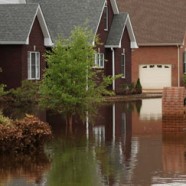
–Excerpt taken from the Hendricks County Flyer 2/20/2014
Officials warn of possible flooding
The Indiana Department of Homeland Security is reminding Hoosiers to be aware of the possibility for strong storms followed by flooding in some areas.
The National Weather Service predicts the storms could contain damaging winds, lightning and periods of moderate to heavy rain. The combination of melting snow, rain, and a deeply frozen ground may cause flooding.
Hoosiers should make sure cell phones and other electronic devices are fully charged in case of a power outage and be ready to take shelter in their homes, places of work or other locations if the need arises, preferably in the lowest level of a building away from windows and doors.
Anyone who lives near bodies of water (ponds, rivers, streams, etc.) should monitor local weather and river forecasts and keep an eye on any waterways.
Water levels can change rapidly and flooding can begin with little or no warning.
Here we go again…..I feel like I could write a blog every week on just the weather. This week….flooding. How many people have flood insurance?
Let’s just see: [polldaddy poll=7816788]
Just a few inches of water from a flood can cause tens of thousands of dollars in damage. From 2008 to 2012, the average residential flood claim amounted to more than $38,000. Flood insurance is the best way to protect yourself from devastating financial loss.
Flood insurance is available to homeowners, renters, condo owners/renters, and commercial owners/renters. Costs vary depending on how much insurance is purchased, what it covers and the property’s flood risk.
Before you buy, make sure you understand, all forms cover for buildings and contents, however; you want to understand the many other options available. For instance, there is typically a 30-day waiting period from the date of purchase. If you are in Indiana, you already have needed it in place with our big thaw still to come.
Know what is and is not covered, and how. (There is nothing worse than having flood insurance to find out part of it does not cover what you believed it did. )
Examples of some things that may not be covered:
- Damage caused by moisture, mildew or mold that could have been avoided by the property owner
- Currency, precious metals and valuable papers such as stock certificates
- Property and belongings outside of an insured building such as trees, plants, wells, septic systems, walks, decks, patios, fences, seawalls, hot tubs and swimming pools
- Living expenses such as temporary housing
- Financial losses caused by business interruption or loss of use of insured property
- Most self-propelled vehicles such as cars, including their parts (see Section IV.5 in your policy)
Last but not least, before purchasing Flood Insurance from your agent, have a set of questions ready to ask. This will help you to make the most informed decision. Here is a list, although not totally inclusive, it gives you a good start:
- What flood zone do I live in? What is my property’s flood risk?
- Is flood insurance mandatory for my property? Will the lender require it?
- Even if flood insurance isn’t required by my lender, do I still need it?
- Do I qualify for a Preferred Risk Policy?
- Does my community participate in the NFIP Community Rating System (CRS)? If so, does my home qualify for a CRS rating discount?
- What will and won’t be covered against flood damage?
- Will my flood insurance policy be backed by the federal government?
- How much coverage should I get for my building and for my contents?
- What options do I have to reduce my premium?
- Are there additional expenses or agency fees I should be aware of?
- Will my policy provide Replacement Cost Value or Actual Cash Value? And what is the difference between the two?
- Who should I call if I have a flood claim?
- How can I pay for my policy?
- How will my policy be renewed?
The bottom line with the purchase of Flood Insurance is the same as every other insurance. Identify your Risk, understand the coverages, don’t overpurchase, ask questions. A good Agent will help you decide whether flood insurance is the right purchase for you









Recent Comments